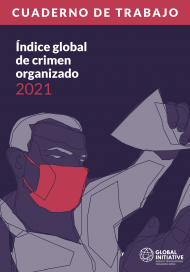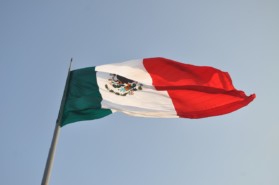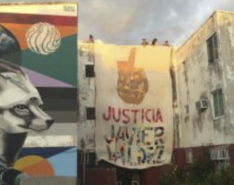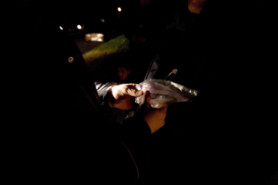Posted on 17 Apr 2020
In March, the US Department of Justice indicted Nicolás Maduro and other Venezuelan government officials for their alleged involvement in drug trafficking. Would Maduro’s removal from office have an impact on the narco-corruption that has long pervaded the Venezuelan political and military authorities?
Over the last five years, the United States has charged a growing number of current and former Venezuelan government officials with involvement in or facilitation of drug trafficking. The series of indictments unveiled in a press conference on 26 March, in which 15 current and former Venezuelan government officials were accused of involvement in cocaine trafficking, support for narco-terrorism and corruption, echoed this trend.
One of those indicted was Nicolás Maduro, Venezuela’s leader. Although Maduro claims the country’s presidency, this has been contested by domestic and international actors since 2019. But he maintains tight de facto control over the country. The charges thus represent an extremely rare effort by the US to prosecute a foreign head of state, a move not seen in the Americas since the 1988 indictment, and later removal and arrest, of Panamanian leader Manuel Noriega.
Since Maduro’s indictment was announced, most focus has been on the political subtext and impact of the charges. The US has been attempting to remove Maduro from office, and the charges have been interpreted as an aid to this end. However, the charges were laid by seasoned prosecutors, who are presumably confident that the evidence they have is sufficient to secure a conviction.
Because of this, the substance of the indictment and the alleged facts themselves are informative. In particular, the details provide information on how drug traffickers can pull the levers of power within states to their bidding and how state agents can slowly transform into traffickers in their own right.
The connection between Maduro, Venezuela and cocaine trafficking is alleged to stretch back to the late 1990s. At the time, Hugo Chavez was president, Maduro was a politician rapidly coming through the ranks, and neighboring Colombia’s civil conflict was spilling over into Venezuela. Under pressure from the Colombian government, the Fuerzas Armadas Revolucionarias de Colombia(FARC), a leftist insurgent group heavily involved in the cocaine trade, relocated personnel and cocaine refinement operations to Venezuelan border states, such as Apure, Zulia and Tachira.
The indictment alleges that this relocation was the result of an agreement between the FARC and members of the Chavez regime. Although the US details one specific network, the Cartel de los Soles, as partnering with the FARC, the reality is more complicated. Rather than a structured cartel, independent reporting suggests individual National Guard commanders in border states were the first to become significantly enmeshed in the cocaine trade. Their involvement was enabled, however, by the actions and inactions of high-level officials. Support for the FARC was a policy priority for the Chavez regime. In contrast, countering drug trafficking was steadily deprioritized by senior officials, a trend further fuelled by a desire not to undermine the FARC’s finances, and hence martial capacity, which depended significantly on the cocaine trade.
At first, according to the evidence presented and earlier reports, Venezuelan security forces offered protection offered to Colombian cocaine traffickers (those affiliated with the FARC and others) as they moved shipments within Venezuela and transported them out of the country. In this conducive environment opened up by Venezuelan security authorities, shipments of cocaine by air and sea from Venezuela to Central America, the Caribbean and neighbouring states in South America grew rapidly to several hundred tonnes a year.
In 2005, Venezuela changed its drug and organized-crime laws, bringing them in line with the 1988 UN Convention on Drugs. Part of these legal changes meant that counter-narcotics investigations and operations, previously the sole remit of the National Guard, were also assigned to the army, air force and navy. Such a redelegation of legal authorities is not unprecedented in Latin America. A number of states, such as Mexico, have relied heavily on their military to counter drug trafficking. Often this is due not only to operational capacity of the military forces, but also to the widespread perception they are less corruptible than law enforcement.
In Venezuela, however, deploying the military as counter-narcotics agents proved catastrophic. Traffickers targeted and corrupted military officers who had been newly empowered to arrest them. Corruption and collusion between various Colombian traffickers and Venezuelan military officers became a serious problem. The spread of corruption led to the emergence of multiple networks within the Venezuelan security and military forces, with groups of officers competing for access to and payments from traffickers.
With time, the operational role of Venezuelan networks began to shift. In addition to protecting traffickers and shipments, Venezuelan military and law-enforcement officers began to resell seized cocaine back to the traffickers. They meanwhile allegedly become more involved in direct trafficking of cocaine sourced from Colombia. The reasons for this shift are not completely clear. Colombian traffickers have long maintained an in-kind compensation policy, providing networks that assist them through payments in cocaine rather than cash. Some degree of this happened in Venezuela. There also appears to have been some degree of bartering of weapons for drugs between the FARC and Venezuelan officials. In both instances, the networks forged connections with distributors in North America and Europe in order to sell the product they now held.
As Venezuela’s security forces became more heavily involved in cocaine trafficking, so did high-level officials in the regime, including senior military and intelligence commanders, and politicians, including the former chief of staff to President Chavez.
The indictment alleges that Maduro, elevated to Foreign Minister in 2006, was a key intermediary between the Chavez regime and the FARC, a remit that extended to drug-trafficking deals, it seems. And, allegedly, he was involved in the money laundering of drug proceeds, and reportedly paid US$5 million through one particular money-laundering scheme involving palm oil extraction.
Events in 2009 underscored the degree to which the interests of the traffickers had intersected with and influenced affairs of state in Venezuela. That year, a coup occurred in Honduras, which had been a vitally important landing point for trafficking flights coming from Venezuela. According to the indictment, Maduro and other government ministers allegedly met with FARC representatives, in part over fears that the instability around the coup would impact trafficking. Maduro then travelled to Honduras in his role as Foreign Minister, reportedly in order to ensure that the coup would not derail trafficking operations.
When Maduro became leader in 2013, it had little material impact on drug trafficking in Venezuela. Though Venezuelan officials were reportedly instructed to be less overt in their trafficking activities – especially after 1.3 tonnes of cocaine were seized by French police on a commercial flight arriving from Venezuela – narcotics trafficking did not stop. Rather, it accelerated throughout the 2010s, to the point where Venezuela had become a key conduit for Colombian cocaine routed to North America and Europe.
The US indictment of Maduro and other Venezuelan officials is unlikely to have much practical effect at present. Maduro is highly unlikely to surrender and there is little realistic chance of the US arresting him while he is in office. Indeed, the charges and the lengthy prison sentences they would imply may well complicate efforts to ease Maduro from office, which is the key US diplomatic objective.
The indictment does, however, offer both some valuable lessons on trafficker-state engagement, as well as an implicit warning about the challenge of reforming Venezuela’s security and defence forces.
It underscores how drug trafficking can become rooted in a country, by design or otherwise, when the issue is deprioritized by key politicians. The question of whether the Chavez administration planned to make Venezuela a key drug trafficking entrepot is unresolved. What is more evident, however, is the strategic tolerance shown by senior regime figures towards FARC operations in Venezuelan border regions, and the minimal prioritization of counter-narcotics as a national security concern. These dynamics created an environment in which National Guard and military commanders faced limited risk to their careers or of imprisonment for abetting traffickers in their activities.
The indictment also highlights the many ways in which the roles of high-level officials can intersect with traffickers’ interests, and the rapidity with which this can occur. What began in the late 1990s as protection of traffickers by Venezuelan state officials had morphed a decade later into a far more direct involvement by authorities in the transnational cocaine trade by leveraging key services of the state. For example, the palm-oil money-laundering scheme was nominally billed as an economic-development initiative. The weapons bartered for cocaine came out of Venezuelan official stockpiles. Maduro’s trip to Honduras was flagged as a peacebuilding measure, with the reported effort to aid traffickers carefully hidden from sight.
Finally, the case of Venezuela underscores how amorphous and competitive trafficking networks within government can be, even within hierarchic security and defence forces. A structured Cartel de los Soles may exist in some form, with high-level officials, such as Maduro, able to exert some degree of control over official trafficking. However, like other well-known drug cartels, such as Mexico’s Sinaloa Federation, there seems to be a broad degree of autonomy, self-enrichment and competitiveness between lower-level trafficking cells and networks within the security and defence forces, as long as their activities don’t interfere with key pecuniary or national security priorities of high-level Maduro government officials.
And therein lies the risk for the future. Even if Maduro is removed from power, departing with the other high-level officials named in the US indictments, it is unlikely to have a significant impact on the narco-corruption and trafficking networks that have permeated the Venezuelan security and defence forces. Reforming and de-linking Venezuelan officials from the cocaine trade will be a long, difficult and politically dangerous affair for future governments. Nonetheless, it is a challenge that will inevitably have to be tackled.



